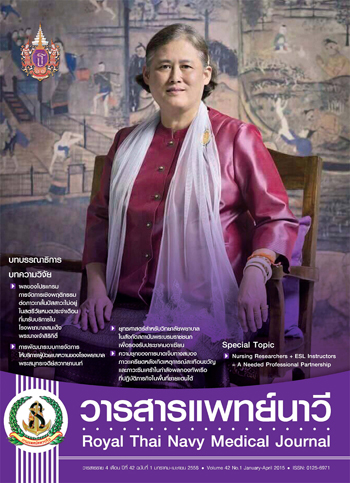ความชุกของการบาดเจ็บทางสมอง ภาวะเครียดหลังเกิดเหตุการณ์สะเทือนขวัญและภาวะซึมเศร้าในกำลังพลกองทัพเรือที่ปฏิบัติภารกิจในพื้นที่ชายแดนใต้
Main Article Content
Abstract
Objectives: To study the prevalence of traumatic brain injury (TBI) and the coprevalence of
posttraumatic stress disorder (PTSD) and depression with which returning the Royal Thai
Navy personnel (RTN) deployed for the peace building process in southernmost provinces
of Thailand
Methods: A retrospective study was conducted. An anonymous sample of six hundred and
sixty five Royal Thai Navy personnel completed four self-administered questionnaires :
1) Demographic Questionnaire, 2) traumatic brain Injury (3 DVBIC), 3) Posttraumatic Stress
Disorder Checklist-Military Version (PCL-M) and 4) Patient Health Questionnaire (PHQ-9).
The association between Mild TBI, PTSD, and depression was analyzed by using the Pearson
product moment correlation coefficient and chi-square. Additionally, a t-test, one-way
ANOVA were used to examine data of PTSD and depression. Binary logistic regression was
performed to identity the potential predictors of PTSD of RTN personnel.
Results: Analyses indicated a prevalence of all three conditions in this population, with Mild
TBI, PTSD, and depression present is 9.3%, 10.3% , and 8.4%, respectively. Obviously, Mild
TBI was particularly associated with PTSD (p < 0.01), but not significant association with
depression. Additionally, Mild TBI history was common among RTN personnel injured by
blasts, bullets/shrapnel, motor vehicle crashes, and falls. Besides, the most common post
concussive symptoms (PCSs) were balance and memory problems. Whereas, hyperarousal
symptoms have often occurred in the PTSD. Furthermore, the RTN personnel who attached
to the high risk unit response to military deployment as well as who were hesitate the
desertion, maladaptation and relationship problems with their cohort tend to have more
problem in terms of both PTSD and depression. Finally, three factors made independent
contributions to the prediction of PTSD i.e. depression (p<.001); mTBI (p<.01); and adaptation
(p<.05).
Conclusion: These results found that Mild TBI, PTSD, and depression underscore the
complexity of the presenting complaints in RTN personnel and support the importance of
a multidisciplinary term approach to assessment treatment and follow up.


